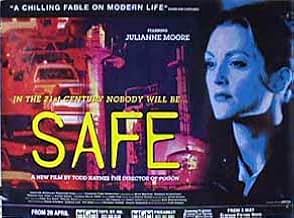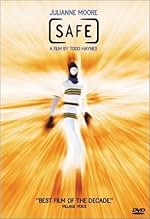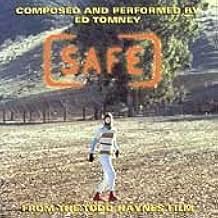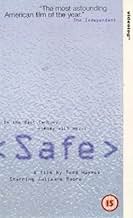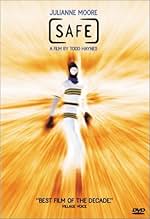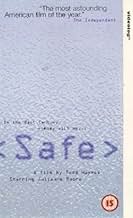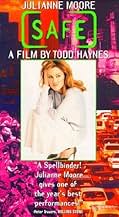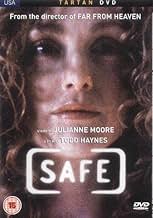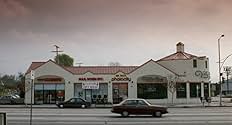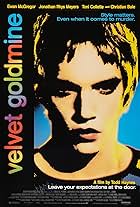CALIFICACIÓN DE IMDb
7.1/10
18 k
TU CALIFICACIÓN
Una ama de casa corriente con una vida acomodada que vive en las afueras de la ciudad, desarrolla una enfermedad llamada Sensibilidad química múltiple.Una ama de casa corriente con una vida acomodada que vive en las afueras de la ciudad, desarrolla una enfermedad llamada Sensibilidad química múltiple.Una ama de casa corriente con una vida acomodada que vive en las afueras de la ciudad, desarrolla una enfermedad llamada Sensibilidad química múltiple.
- Dirección
- Guionista
- Elenco
- Premios
- 4 premios ganados y 13 nominaciones en total
Martha Velez
- Fulvia
- (as Martha Velez-Johnson)
Chauncey Leopardi
- Rory
- (as Chauncy Leopardi)
Allan Wasserman
- Client
- (as Alan Wasserman)
Jean St. James
- Client's Wife
- (as Jean Pflieger)
- Dirección
- Guionista
- Todo el elenco y el equipo
- Producción, taquilla y más en IMDbPro
Opiniones destacadas
9Lleu
I call this an important film because it deals with a very topical social issue in an original and subtle manner. It is also ambiguous (as the previous reviewer pointed out), which is something American audiences and critics often can't handle. Carol, an affluent suburban housewife played by Julianne Moore, is becoming increasingly disturbed and unable to cope with the alleged pollution and impurities in the environment. What could have been a "disease of the week" TV movie, however, is handled with surprising depth by director Todd Haynes. Carol ends up in a new agey community dedicated to healing people like herself. What is fascinating is that Safe, while exploring the pressures and toxicity of modern life, is also a brilliant look at the pathology of fleeing from life and seeking an environment of "purity." For Carol ends up, instead of recovering, more and more alienated and withdrawn. Safe does not provide answers to this dilemma, but it sure makes us look at some difficult questions.
Although it's been almost ten years since filmmaker Todd Haynes (Velvet Goldmine, Far From Heaven) made Safe, the film's only secured cinematic release in Australia in 2004. As Safe quietly satirises the 80s, the delayed release improves it, adding another layer of perspective to a heroine who lives life in a series of bubbles.
It's 1987, and timid California housewife Carol (a young Julianne Moore) is immersed in upper-middle class minutiae ensuring her couch is the right colour, sleepwalking through a tepid aerobics class, and submitting to her husband (Greg White from 24). But gradually cracks appear in this pristine life, tiredness, unexplained illness until she is diagnosed with multiple chemical sensitivity. She then moves to Wrenwood, a healing retreat founded by the charismatic Peter (Peter Friedman) but will this solve her problem? Or is it just another escape? Safe is a very interesting film about a woman so overwhelmed by her environment that she becomes allergic to it. Writer and director Haynes has combined aspects of the disease film (e.g. Love Story) with the psychological thriller as Carol doesn't know what triggers her symptoms, the audience never knows when she'll have another attack.
While Haymes criticises the New Age belief that illness is psychologically-based, in Carol's case, it's impossible to separate the psychological and physical aspects of her illness. The cinematography shows her dwarfed by her environment and Haymes offers no easy solutions. ***½/***** stars.
It's 1987, and timid California housewife Carol (a young Julianne Moore) is immersed in upper-middle class minutiae ensuring her couch is the right colour, sleepwalking through a tepid aerobics class, and submitting to her husband (Greg White from 24). But gradually cracks appear in this pristine life, tiredness, unexplained illness until she is diagnosed with multiple chemical sensitivity. She then moves to Wrenwood, a healing retreat founded by the charismatic Peter (Peter Friedman) but will this solve her problem? Or is it just another escape? Safe is a very interesting film about a woman so overwhelmed by her environment that she becomes allergic to it. Writer and director Haynes has combined aspects of the disease film (e.g. Love Story) with the psychological thriller as Carol doesn't know what triggers her symptoms, the audience never knows when she'll have another attack.
While Haymes criticises the New Age belief that illness is psychologically-based, in Carol's case, it's impossible to separate the psychological and physical aspects of her illness. The cinematography shows her dwarfed by her environment and Haymes offers no easy solutions. ***½/***** stars.
Safe is perhaps a tad too ambiguous for its own good. The film focuses on a suburban housewife (Julianne Moore) who feels sick for no reason. Her doctor suggests psychological treatment, but she finds more comfort in the idea that her sickness is caused by environmental factors, such as car fumes and the like. Haynes never answers the question of what is really affecting Moore. One moment you're sure it's psychological, then physical symptoms displayed by the woman are undeniable. It's not that I really wanted the questions answered, but the constant toying with the audience does become a strain, especially as the film runs for two hours and not much happens. There's also the possibility that the story isn't meant to represent reality, but instead it might be allegorical. This makes it all the more difficult to unravel. I know I sound sort of negative in this review, but I did like it. I don't think it works completely, but I found it fascinating. One reason it does work at all is that Haynes' major goal seems to want to put us inside Moore's head. It shows us what it would be like to suffer and not know why, and how comfortable it might be to, say, join a cult, which is basically what she does in the end. Not entirely satisfying, but definitely well worth a look.
I watched Safe for our coverage of 1980s's health movements and the AIDS virus with a special eye for the conflict between New Age healers and "the medical profession." Safe connects so well with both; although there's no real homosexuality anxieties in the film, AIDS seem the unconquerable illness penetrating the lives of happy suburban people.
First of all, Julianne Moore is absent in the film. Her character, Carol White, is a model, rich California suburban housewife. We notice how absent she is from the moment that sex with her husband produces nothing in her, but she goes through the motions of kissing him and petting him afterwards. She has mechanical conversations with friends, with mother, with cleaning lady in her ultramodern, lush, carpeted, fashionably lit house with gardens surrounding it and police patrol by night. She goes to her workouts, cleaners, and arranges furniture.
This is a really tragic film. It's also brilliantly shot, edited, acted, and its sets are so appropriate. The use of teal and sky blue becomes numbing, anesthetizing in Carol's home, as does the harsh lighting of the doctor's office and the hospital. The Wrenwood Center itself resembles where Deckard would have gone at the end of Blade Runner as the orig. end credits seemed to indicate: mountains and nature as an antidote to the city.
However, it's not URBAN life that seems to be killing Carol- it's SUBURBAN life, it's Northern California, it's fruit diets, mini-malls, 80s music playing in health clubs, housewifes, gardens, pools, teal green couches, endless lines of cars, power lines, and street lights. It's dismal, and her family life is no big help having no real life to it.
At one point, in a really wrenching scene, Carol cries, looks at Greg from the bed and asks "Where am I? Right now?" He responds flatly but tenderly, "You're in Carol and Greg's house." She only cries more.
The question is: what is really wrong with Carol White? Did she succumb to depression and make herself a psychosomatic illness? Is she really sick and dying? Is she just afraid of living? It seems to me the more that Carol is told that she is the only one with the power to cure herself, the less power she seems to have. The final monologue where she stands in front of the group and discusses how far she's come is inarticulate, random, unthought, and not a good sign.
The acting is done well for its purposes, especially by Peter Dunn, the leader. He creates an interesting portrait of a man who is so determined to be a victim that he's created people who are dependent on him. Peter is the only dynamic presence in the film, but even he wants peace, love, and tranquility in our hearts. That doesn't seem to feed Carol.
This film reminded me of Koyaanisqatsi, visions of emptiness and life out of balance. Carol looks out her car window at the highways and powerlines and headlights, and she reminded me of someone watching that film, fearing technology. Yet even retreating from technology is not an ALTERNATIVE: it's a sign of defeat, isn't it?
The film doesn't offer solutions- only one of the most frightening, eerie, and numbing indictments of suburbia and the New Age that I have ever seen. It puts its images, sets, sounds, actors into a collective vision of decay, expressed through the decline of the model suburban housewife. See it, but don't look for answers or happy endings.
First of all, Julianne Moore is absent in the film. Her character, Carol White, is a model, rich California suburban housewife. We notice how absent she is from the moment that sex with her husband produces nothing in her, but she goes through the motions of kissing him and petting him afterwards. She has mechanical conversations with friends, with mother, with cleaning lady in her ultramodern, lush, carpeted, fashionably lit house with gardens surrounding it and police patrol by night. She goes to her workouts, cleaners, and arranges furniture.
This is a really tragic film. It's also brilliantly shot, edited, acted, and its sets are so appropriate. The use of teal and sky blue becomes numbing, anesthetizing in Carol's home, as does the harsh lighting of the doctor's office and the hospital. The Wrenwood Center itself resembles where Deckard would have gone at the end of Blade Runner as the orig. end credits seemed to indicate: mountains and nature as an antidote to the city.
However, it's not URBAN life that seems to be killing Carol- it's SUBURBAN life, it's Northern California, it's fruit diets, mini-malls, 80s music playing in health clubs, housewifes, gardens, pools, teal green couches, endless lines of cars, power lines, and street lights. It's dismal, and her family life is no big help having no real life to it.
At one point, in a really wrenching scene, Carol cries, looks at Greg from the bed and asks "Where am I? Right now?" He responds flatly but tenderly, "You're in Carol and Greg's house." She only cries more.
The question is: what is really wrong with Carol White? Did she succumb to depression and make herself a psychosomatic illness? Is she really sick and dying? Is she just afraid of living? It seems to me the more that Carol is told that she is the only one with the power to cure herself, the less power she seems to have. The final monologue where she stands in front of the group and discusses how far she's come is inarticulate, random, unthought, and not a good sign.
The acting is done well for its purposes, especially by Peter Dunn, the leader. He creates an interesting portrait of a man who is so determined to be a victim that he's created people who are dependent on him. Peter is the only dynamic presence in the film, but even he wants peace, love, and tranquility in our hearts. That doesn't seem to feed Carol.
This film reminded me of Koyaanisqatsi, visions of emptiness and life out of balance. Carol looks out her car window at the highways and powerlines and headlights, and she reminded me of someone watching that film, fearing technology. Yet even retreating from technology is not an ALTERNATIVE: it's a sign of defeat, isn't it?
The film doesn't offer solutions- only one of the most frightening, eerie, and numbing indictments of suburbia and the New Age that I have ever seen. It puts its images, sets, sounds, actors into a collective vision of decay, expressed through the decline of the model suburban housewife. See it, but don't look for answers or happy endings.
Julianne Moore is one of my favorite actresses and that's the reason I decided to watch this one.
This film is labeled as Drama/Thriller. Well, the drama's here, no doubt, as Carol White (Moore) slowly begins to succumb to the multiple effects of all types of pollution that pervade our technocratic consumer societies. There's psychological drama also as her husband, Greg (Xander Berkeley) tries to come to some understanding about Carol and how his marriage seems to be slowly disintegrating. And, there's drama also when Carol reacts violently to various chemicals, such that she is hospitalized and undergoes a battery of tests...
But... Thriller? Not at all, not by a long shot.
This is something better than mere thrills at one level, it's a modern horror story that we are all living, because we are all part of this petrochemical world that we cannot reasonably escape. At another level, it's also the horror that results when a person decides to dislocate from the polluted world we all live in and construct another world within the mind. The end result of such an act is usually madness... eventually.
Beautifully acted by all the players, so that it seems that they aren't acting; it is, after all, all too real, is it not? The musical background is simply stunning brooding, dark, menacing, and reminiscent of a David Lynch soundtrack. Visually, for the first half, you are battered with repetitive images of unending lines of traffic, excessive noise, mindless activities, rampant consumerism all designed to reflect the battered mind and body of Carol as she struggles to determine her future in a world that is increasingly threatening.
How she does that forms the second half. Does she succeed? I could say Yes and No, but I'll leave it up to you to decide when you see it. Enjoy...if you can!
This film is labeled as Drama/Thriller. Well, the drama's here, no doubt, as Carol White (Moore) slowly begins to succumb to the multiple effects of all types of pollution that pervade our technocratic consumer societies. There's psychological drama also as her husband, Greg (Xander Berkeley) tries to come to some understanding about Carol and how his marriage seems to be slowly disintegrating. And, there's drama also when Carol reacts violently to various chemicals, such that she is hospitalized and undergoes a battery of tests...
But... Thriller? Not at all, not by a long shot.
This is something better than mere thrills at one level, it's a modern horror story that we are all living, because we are all part of this petrochemical world that we cannot reasonably escape. At another level, it's also the horror that results when a person decides to dislocate from the polluted world we all live in and construct another world within the mind. The end result of such an act is usually madness... eventually.
Beautifully acted by all the players, so that it seems that they aren't acting; it is, after all, all too real, is it not? The musical background is simply stunning brooding, dark, menacing, and reminiscent of a David Lynch soundtrack. Visually, for the first half, you are battered with repetitive images of unending lines of traffic, excessive noise, mindless activities, rampant consumerism all designed to reflect the battered mind and body of Carol as she struggles to determine her future in a world that is increasingly threatening.
How she does that forms the second half. Does she succeed? I could say Yes and No, but I'll leave it up to you to decide when you see it. Enjoy...if you can!
Argumento
¿Sabías que…?
- TriviaWhen it came time for Julianne Moore to record the director's commentary for the 2003 DVD release, this was the first time the lead actress had seen the movie in its entirety.
- ErroresAlthough this film was explicitly set in 1987, while Carol is driving on the highway, she passes a burgundy 1992 Cadillac de Ville.
- Citas
[last lines]
Carol White: I love you. I love you. I really love you. I love you.
Selecciones populares
Inicia sesión para calificar y agrega a la lista de videos para obtener recomendaciones personalizadas
- How long is Safe?Con tecnología de Alexa
Detalles
Taquilla
- Presupuesto
- USD 1,000,000 (estimado)
- Total en EE. UU. y Canadá
- USD 512,245
- Fin de semana de estreno en EE. UU. y Canadá
- USD 15,830
- 25 jun 1995
- Total a nivel mundial
- USD 512,558
Contribuir a esta página
Sugiere una edición o agrega el contenido que falta

Principales brechas de datos
By what name was A salvo (1995) officially released in India in English?
Responda

